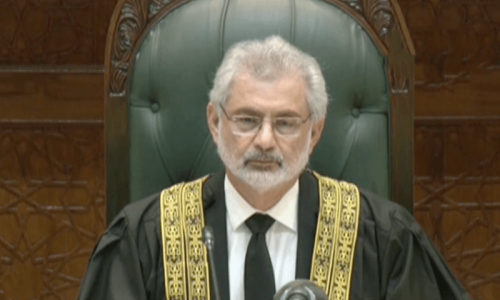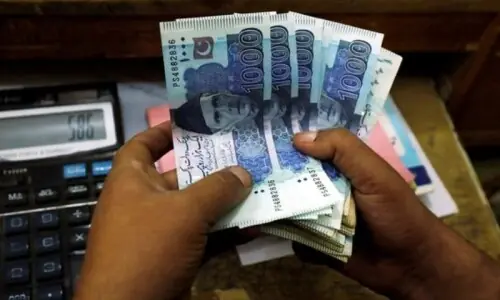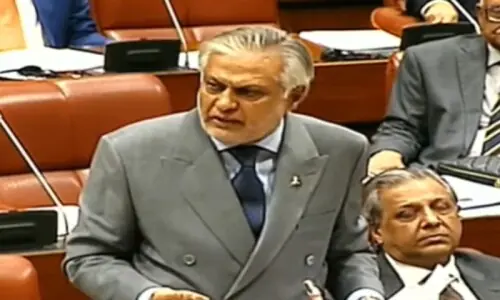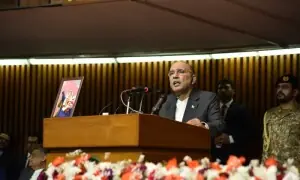• Bench does not suspend FIA proceedings against reporters; CJP Isa observes ‘fair criticism’ does not entail punishment
• AGP says fault-finding should be aimed at judgement, not judges
ISLAMABAD: As the Supreme Court emphasised journalists should not be booked over a social media campaign against superior judges, Attorney General for Pakistan Mansoor Usman Awan assured the apex court that criminal cases will not be registered against reporters since “honest criticism” of a judgement was not a crime.
Led by Chief Justice Qazi Faez Isa, a three-member bench also comprising Justice Muhammad Ali Mazhar and Justice Musarrat Hilali had taken up a suo motu case regarding the harassment of journalists. The court, however, did not pay heed to a request for the suspension of proceedings conducted by the Federal Investigation Agency (FIA) against journalists.
Against the backdrop of a smear campaign against judges, the FIA had issued notices to over a dozen journalists and called them on Monday (Jan 29).
The CJP observed that he did not mind if “someone makes fun of him but mocking the judiciary brings harm to the country, reminding the limits the Constitution imposes on criticism”.
The suo motu notice was taken on a joint resolution of the Press Association of the Supreme Court (PAS) and the Islamabad High Court Journalists Association (IHCJA). In the roster, an earlier case on the same issue instituted in 2021 — also at the request of the PAS — was clubbed with the instant case.
During the hearing, PAS President Aqeel Afzal recalled that on Sunday caretaker Information Minister Murtaza Solangi claimed that out of a list of 47 journalists, notices were issued to 22 by the FIA.
According to AGP Awan, the benchmark will remain that journalists should keep a balance between the requirements of Article 14 — which ensures the dignity of man — and Article 19 which ensures freedom of speech. He added that criticism should be targeted towards the judgement.
“The benchmark, however, will remain that the criticism should be targeted towards the judgement instead of becoming part of a smear campaign against the judges,” the AGP said.
CJP Isa said ‘fair criticism’ was not only the right of journalists but also of every citizen; therefore, no criminal action could be initiated if the criticism was related to judgements as stipulated under Article 19. He said the court would ensure freedom of expression for every journalist.
It ordered AGP Awan to furnish comprehensive statements regarding the outcome of investigations and actions taken in relation to earlier incidents of harassment of journalists; for instance, coercive actions against journalists Matiullah Jan, Asad Ali Toor, Imran Shafqat, and Aamir Mir.
The CJP asked AGP Awan to reach out to any intelligence agency, including the Inter-Services Intelligence (ISI) — and if he failed to get any cooperation on their behalf then he should report it back to the top court.
Proper probe missing
Mr Toor, Mr Jan, and a representative of Mr Mir and Mr Shafqat informed the court that a proper investigation was not conducted in their cases. Mr Toor explained that an FIR was registered against unknown persons in his case, but there was no progress in this regard.
According to the journalist, the police did not carry out geofencing even though the assailants during the attack were in contact with someone through their mobile phones.
Mr Jan also highlighted the assassination of Arshad Sharif, who was shot dead in Kenya.
In its short order, the court noted that it was alleged that actions against journalists, who were picked up or assaulted, were carried out by intelligence agencies — authorities under the control and command of the federal government.
The court also directed that the investigation officers who were conducting a probe into these attacks would not be hampered in any way while conducting the investigations.
During the hearing, Justice Hilali regretted it was unfortunate that derogatory language against people had become a source of earning for ‘certain people’ on social media platforms.
Justice Hilali said that social media has badly damaged the institutions of the country.
Justice Mazhar said unlike print or electronic media, social media users have no code of conduct, adding, “judgement is a public property and could be criticised but in a temperate language”.
The CJP regretted that no action was taken when women workers, who administered polio drops to children, were killed with impunity; girls’ schools were bombed; and women were harassed to keep them away from education.
“I have read a fatwa cautioning women not to cast their votes,” the CJP regretted, but no action was taken though the fatwa did not come under free speech but rather violated people’s right to vote.
Published in Dawn, January 30th, 2024





























